The cardiopulmonary functional testing platform market is projected to expand from USD 6,573.5 million in 2025 to USD 10,405.6 million in 2035 at a CAGR of 4.7%. Demand-side dynamics points at adoption patterns shaped by clinical, institutional, and patient-level requirements. Hospitals, diagnostic centers, and research institutions constitute the largest demand base, with procurement influenced by the growing prevalence of respiratory and cardiovascular disorders. The rising incidence of chronic obstructive pulmonary disease, asthma, heart failure, and exercise-induced complications has reinforced the use of cardiopulmonary exercise testing platforms as part of routine diagnostic protocols. Increasing referrals for exercise tolerance and rehabilitation assessment contribute to consistent demand across developed and developing healthcare systems.
Adoption is influenced by the degree of institutional investment in diagnostic infrastructure. Large multispecialty hospitals and academic centers prioritize high-end cardiopulmonary testing systems with integrated sensors and data analytics. Mid-tier hospitals and outpatient diagnostic labs drive demand for portable, cost-effective devices that can be integrated into existing workflows. This dual demand spectrum creates a balanced market structure, where premium and mid-range product categories grow simultaneously. Patient monitoring needs in homecare settings are gradually expanding demand for compact, user-friendly platforms that support remote consultation models, though adoption remains concentrated in urban centers with digital health infrastructure.
Geographic demand trends highlight regional differences. North America represents the most advanced market due to established reimbursement pathways and high disease awareness. Europe follows with strong adoption in preventive healthcare programs, especially in countries emphasizing early detection and rehabilitation for aging populations. Asia Pacific exhibits accelerating demand growth, driven by expanding healthcare infrastructure, larger patient pools, and increasing investments in diagnostic equipment. Latin America and Africa demonstrate emerging demand linked to urban hospital expansion, though budgetary constraints limit penetration of advanced platforms. These regional imbalances highlight how affordability, infrastructure readiness, and reimbursement frameworks shape demand differently across countries.
Clinical innovation also drives adoption. Platforms with advanced data analytics, wireless sensors, and integration into electronic health records are increasingly preferred by institutions seeking to reduce diagnostic variability and improve outcomes. Demand is supported by the ability of newer platforms to provide real-time insights, support telemedicine models, and reduce patient turnaround times. This functional shift creates stronger interest among providers aiming to enhance service efficiency and reduce diagnostic errors.
The cardiopulmonary functional testing platform market demonstrates demand growth anchored in rising disease prevalence, diversification of end-use settings, and the transition toward digitally integrated healthcare systems. Hospitals remain the cornerstone of demand, while diagnostic labs, research institutions, and emerging homecare adoption expand the overall user base. At 4.7% CAGR, demand-side dynamics confirm steady expansion through a combination of clinical necessity, healthcare investment, and technological preference shaping purchasing decisions between 2025 and 2035.
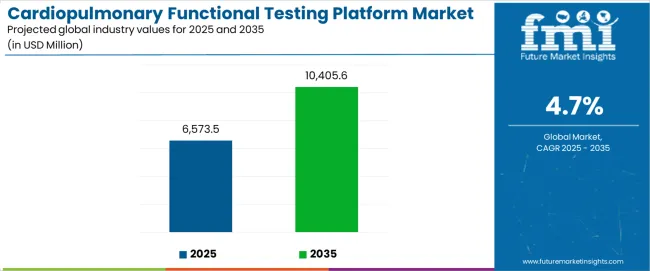
Between 2025 and 2030, the cardiopulmonary functional testing platform market is projected to expand from USD 6,573.5 million to USD 8,270.5 million, resulting in a value increase of USD 1,697.0 million, which represents 44.3% of the total forecast growth for the decade. This phase of development will be shaped by increasing demand for point-of-care testing solutions, rising geriatric population requiring respiratory monitoring, and growing availability of integrated diagnostic platforms across medical facilities and specialized pulmonary function laboratories.
Between 2030 and 2035, the cardiopulmonary functional testing platformmarket is forecast to grow from USD 8,270.5 million to USD 10,405.6 million, adding another USD 2,135.1 million, which constitutes 55.7% of the ten-year expansion. This period is expected to be characterized by the advancement of artificial intelligence-driven diagnostic algorithms, the integration of telemedicine capabilities for remote monitoring, and the development of portable testing systems across diverse healthcare categories. The growing emphasis on preventive healthcare and early disease detection will drive demand for advanced platform varieties with enhanced measurement accuracy, improved patient comfort, and superior connectivity characteristics.
| Metric | Value |
|---|---|
| Estimated Value in (2025E) | USD 6,573.5 million |
| Forecast Value in (2035F) | USD 10,405.6 million |
| Forecast CAGR (2025 to 2035) | 4.7% |
The medical diagnostics market is the largest contributor, accounting for approximately 30-35%. Cardiopulmonary functional testing platforms are used in clinical settings for assessing heart and lung functions, particularly in conditions such as COPD, asthma, and heart failure. These platforms help healthcare providers evaluate respiratory efficiency, oxygen consumption, and cardiovascular health, driving the need for advanced diagnostic tools. The healthcare equipment market holds around 25-30%, as cardiopulmonary testing platforms are an essential part of medical diagnostics, integrated with various monitoring and testing devices such as spirometers, ECG machines, and pulse oximeters.
The telemedicine and remote monitoring market contributes approximately 15-18%, driven by the increasing trend of virtual healthcare and remote patient monitoring. Cardiopulmonary functional tests, integrated into telemedicine platforms, allow patients to perform tests at home and send the results to healthcare providers for analysis, making healthcare more accessible. The clinical research market also plays a significant role, with a 10-12% share, as these testing platforms are essential in clinical trials for evaluating the effectiveness of new treatments or drugs for heart and lung diseases. The elderly care and chronic disease management market represents about 8-10%, as aging populations and increasing chronic diseases drive the need for regular cardiopulmonary function testing to monitor health conditions and prevent complications.
Market expansion is being supported by the increasing global demand for comprehensive respiratory assessment solutions and the corresponding shift toward integrated diagnostic platforms that can provide superior clinical insights while meeting healthcare provider requirements for accurate patient evaluation and evidence-based treatment planning processes. Modern healthcare facilities are increasingly focused on incorporating diagnostic technologies that can enhance clinical efficiency while satisfying demands for reliable, consistently performing testing systems and optimized patient care protocols. Advanced cardiopulmonary platforms' proven ability to deliver measurement accuracy, comprehensive assessment capabilities, and diverse clinical applications makes them essential equipment for hospitals and specialized diagnostic centers.
The growing emphasis on preventive healthcare and early disease detection is driving demand for high-performance cardiopulmonary testing systems that can support comprehensive patient assessment and clinical excellence across pulmonary medicine, cardiology, and rehabilitation medicine categories. Healthcare provider preference for platforms that combine diagnostic precision with operational flexibility is creating opportunities for innovative implementations in both traditional hospital settings and emerging telehealth applications. The rising influence of value-based healthcare models and clinical outcome optimization is also contributing to increased adoption of cardiopulmonary platforms that can provide measurable diagnostic benefits and reliable clinical performance.
The cardiopulmonary functional testing platform market is segmented by type, application, and region. By type, the market is divided into software, equipment, and others. Based on application, the market is categorized into hospital and clinic. Regionally, the market is divided into North America, Europe, Asia Pacific, Latin America, Middle East & Africa, and other regions.
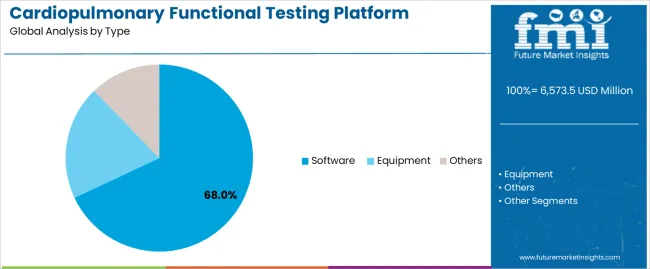
The software segment is projected to account for 68% of the cardiopulmonary functional testing platform market in 2025, reaffirming its position as the leading product category. Healthcare facilities and diagnostic centers increasingly utilize software-based platforms for their superior data management characteristics, established integration capabilities, and essential functionality in diverse clinical applications across multiple medical specialties. Software platforms' standardized interface characteristics and proven cost-effectiveness directly address healthcare provider requirements for reliable diagnostic workflows and optimal clinical value in medical applications.
This product segment forms the foundation of modern cardiopulmonary testing operations, as it represents the format with the greatest clinical scalability potential and established compatibility across multiple healthcare information systems. Healthcare investments in digital transformation and clinical standardization continue to strengthen adoption among efficiency-conscious medical facilities. With providers prioritizing data accuracy and workflow optimization, software platforms align with both operational objectives and diagnostic requirements, making them the central component of comprehensive cardiopulmonary assessment strategies.
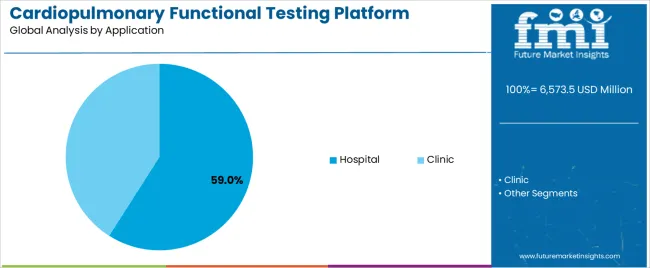
Hospital is projected to represent 59% of the cardiopulmonary functional testing platform market in 2025, underscoring its critical role as the primary application environment for quality-focused healthcare facilities seeking superior diagnostic capabilities and enhanced patient care credentials. Medical providers and hospital systems prefer hospital applications for their established clinical workflows, proven diagnostic effectiveness, and ability to maintain exceptional accuracy profiles while supporting comprehensive patient assessment during diverse medical procedures. Positioned as essential applications for discerning healthcare providers, hospital offerings provide both diagnostic excellence and operational efficiency advantages.
The segment is supported by continuous improvement in integrated healthcare technology and the widespread availability of established regulatory frameworks that enable clinical compliance and premium diagnostic positioning at the institutional level. Hospital systems are optimizing platform configurations to support clinical differentiation and accessible healthcare delivery strategies. As medical technology continues to advance and healthcare providers seek comprehensive diagnostic capabilities, hospital applications will continue to drive market growth while supporting clinical excellence and patient satisfaction strategies.
The cardiopulmonary functional testing platform market is advancing rapidly due to increasing diagnostic accuracy requirements and growing need for comprehensive respiratory assessment tools that emphasize superior clinical performance outcomes across hospital segments and specialized diagnostic applications. The cardiopulmonary functional testing platform market faces challenges, including high equipment costs, regulatory complexity in medical device approval, and technical expertise requirements affecting implementation economics. Innovation in artificial intelligence integration and portable diagnostic systems continues to influence market development and expansion patterns.
The growing adoption of cardiopulmonary functional testing platforms in telemedicine and remote patient monitoring is enabling healthcare providers to develop clinical protocols that provide distinctive diagnostic capabilities while commanding enhanced patient accessibility positioning and improved care delivery characteristics. Remote monitoring applications provide superior flexibility properties while allowing more sophisticated data collection features across various medical specialties. Healthcare providers are increasingly recognizing the functional advantages of platform positioning for comprehensive patient assessment and efficiency-conscious clinical integration.
Modern cardiopulmonary testing platform manufacturers are incorporating advanced artificial intelligence algorithms, machine learning diagnostic support, and predictive analytics capabilities to enhance clinical decision-making, improve diagnostic accuracy outcomes, and meet healthcare demands for evidence-based treatment solutions. These systems improve diagnostic effectiveness while enabling new applications, including automated pattern recognition and clinical outcome prediction programs. Advanced AI integration also allows healthcare providers to support clinical excellence positioning and regulatory compliance beyond traditional diagnostic operations.
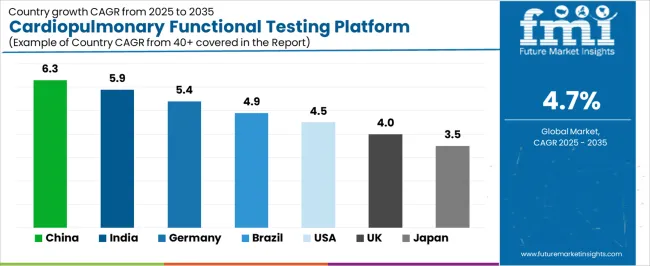
| Country | CAGR (2025-2035) |
|---|---|
| China | 6.3% |
| India | 5.9% |
| Germany | 5.4% |
| Brazil | 4.9% |
| U.S. | 4.5% |
| U.K. | 4.0% |
| Japan | 3.5% |
The cardiopulmonary functional testing platform market is experiencing robust growth globally, with China leading at a 6.3% CAGR through 2035, driven by the expanding healthcare infrastructure, growing prevalence of respiratory diseases, and increasing adoption of advanced diagnostic technologies. India follows at 5.9%, supported by rising healthcare awareness, expanding hospital networks, and growing acceptance of modern diagnostic solutions. Germany shows growth at 5.4%, emphasizing established medical technology capabilities and comprehensive healthcare development. Brazil records 4.9%, focusing on healthcare system modernization and diagnostic expansion. The U.S. demonstrates 4.5% growth, prioritizing clinical excellence and technological advancement.
The report covers an in-depth analysis of 40+ countries, with top-performing countries highlighted below.
Revenue from cardiopulmonary functional testing platform adoption and deployment in China is projected to exhibit exceptional growth with a CAGR of 6.3% through 2035, driven by the country's rapidly expanding healthcare sector, favorable government policies toward medical technology advancement, and initiatives promoting diagnostic standardization across major medical regions. China's position as a leading healthcare market and increasing focus on preventive medicine development are creating substantial demand for high-quality cardiopulmonary platforms in both public and private healthcare systems. Major hospital networks and diagnostic centers are establishing comprehensive testing capabilities to serve growing demand and emerging clinical opportunities.
Demand for cardiopulmonary functional testing platform products in India is expanding at a CAGR of 5.9%, supported by rising healthcare awareness, growing medical infrastructure development, and expanding diagnostic capabilities. The country's developing healthcare systems and increasing commercial investment in medical technology are driving demand for cardiopulmonary platforms across both urban and rural healthcare applications. International medical device companies and domestic healthcare providers are establishing comprehensive operational networks to address growing market demand for quality diagnostic platforms and efficient clinical solutions.
Revenue from cardiopulmonary functional testing platform products in Germany is growing at a CAGR of 5.4% through 2035, supported by the country's advanced healthcare system, established medical technology culture, and leadership in clinical innovation. Germany's sophisticated medical infrastructure and strong support for diagnostic advancement are creating steady demand for both traditional and innovative cardiopulmonary platform varieties. Leading medical device companies and specialized healthcare providers are establishing comprehensive operational strategies to serve both domestic markets and growing European opportunities.
Demand for cardiopulmonary functional testing platform products in Brazil is projected to expand at a CAGR of 4.9% through 2035, driven by the country's emphasis on healthcare infrastructure improvement, medical technology adoption, and clinical capabilities enhancement for diagnostic equipment requiring advanced platform varieties. Brazilian healthcare providers and medical facilities consistently seek commercial-grade diagnostic solutions that enhance clinical differentiation and support patient care operations for both traditional and innovative medical applications. The country's position as a Latin American healthcare leader continues to drive innovation in cardiopulmonary platform applications and clinical excellence standards.
Revenue from cardiopulmonary functional testing platform products in the U.S. is anticipated to grow at a CAGR of 4.5% through 2035, supported by the country's emphasis on clinical innovation, healthcare technology advancement, and comprehensive diagnostic integration requiring efficient platform solutions. American healthcare providers and medical systems prioritize diagnostic accuracy and clinical excellence, making cardiopulmonary platforms essential equipment for both traditional and modern healthcare applications. The country's comprehensive medical excellence and advancing diagnostic patterns support continued market expansion.
Demand for cardiopulmonary functional testing platform products in the UK is expected to expand at a CAGR of 4.0% through 2035, supported by the country's focus on healthcare efficiency, established medical systems, and comprehensive care delivery requiring reliable diagnostic equipment. British healthcare providers and NHS facilities prioritize cost-effective clinical solutions and operational efficiency, making testing platforms essential for both acute and preventive care applications. The country's healthcare system optimization and medical technology integration support continued market development.
Revenue from cardiopulmonary functional testing platform products in Japan is projected to grow at a CAGR of 3.5% through 2035, supported by the country's emphasis on precision medicine, advanced technology integration, and comprehensive healthcare requiring sophisticated diagnostic solutions. Japanese healthcare providers and medical facilities prioritize technological precision and clinical accuracy, making advanced testing platforms essential equipment for both traditional and innovative medical applications. The country's medical technology excellence and advancing precision care patterns support continued market expansion.
The Europe cardiopulmonary functional testing platform market is projected to grow from USD 2,106.6 million in 2025 to USD 3,243.8 million by 2035, recording a CAGR of 4.4% over the forecast period. Germany leads the region with a 38.0% share in 2025, moderating slightly to 37.5% by 2035, supported by its strong medical technology base and demand for premium, clinically advanced diagnostic products. The United Kingdom follows with 21.0% in 2025, easing to 20.5% by 2035, driven by a sophisticated healthcare system and emphasis on clinical excellence and diagnostic efficiency standards. France accounts for 17.5% in 2025, rising to 18.0% by 2035, reflecting steady adoption of advanced diagnostic solutions and healthcare modernization. Italy holds 10.0% in 2025, expanding to 10.8% by 2035 as medical technology innovation and specialized diagnostic applications grow. Spain contributes 6.5% in 2025, growing to 7.0% by 2035, supported by expanding healthcare infrastructure and clinical capabilities enhancement. The Nordic countries rise from 4.0% in 2025 to 4.2% by 2035 on the back of strong healthcare technology adoption and advanced medical practices. BENELUX remains at 3.0% share across both 2025 and 2035, reflecting mature, efficiency-focused healthcare markets.
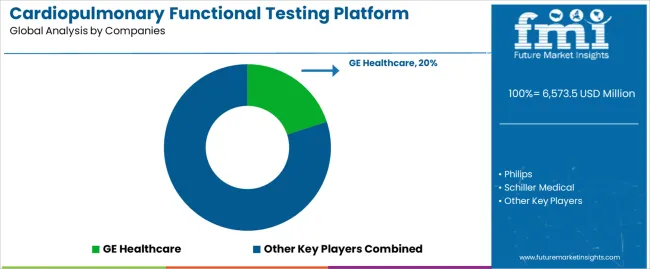
The cardiopulmonary functional testing platform market is characterized by competition among established medical device manufacturers, specialized diagnostic equipment producers, and integrated healthcare solution companies. Companies are investing in sensor technologies, advanced software development systems, product innovation capabilities, and comprehensive distribution networks to deliver consistent, high-quality, and reliable cardiopulmonary platform systems. Innovation in measurement accuracy enhancement, connectivity integration methods, and application-specific product development is central to strengthening market position and healthcare provider satisfaction.
GE Healthcare leads the cardiopulmonary functional testing platform market with a strong focus on medical technology innovation and comprehensive cardiopulmonary platform solutions, offering clinical diagnostic systems with emphasis on accuracy excellence and technological heritage. Philips provides specialized healthcare capabilities with a focus on global market applications and integrated solution networks. Schiller Medical delivers comprehensive diagnostic equipment solutions with a focus on clinical positioning and operational efficiency. Custo Med specializes in portable diagnostic systems with an emphasis on clinical applications. Lode focuses on comprehensive exercise testing and pulmonary function platforms with advanced design and premium positioning capabilities.
The success of cardiopulmonary functional testing platforms in meeting clinical diagnostic demands, healthcare provider-driven accuracy requirements, and performance integration will not only enhance patient care outcomes but also strengthen global medical technology manufacturing capabilities. It will consolidate emerging regions' positions as hubs for efficient diagnostic equipment production and align advanced economies with clinical excellence systems. This calls for a concerted effort by all stakeholders -- governments, industry bodies, manufacturers, distributors, and investors. Each can be a crucial enabler in preparing the cardiopulmonary functional testing platform market for its next phase of growth.
How Governments Could Spur Local Production and Adoption?
How Industry Bodies Could Support Market Development?
How Distributors and Healthcare Industry Players Could Strengthen the Ecosystem?
How Manufacturers Could Navigate the Shift?
| Items | Values |
|---|---|
| Quantitative Units (2025) | USD 6,573.5 million |
| Type | Software, Equipment, Others |
| Application | Hospital, Clinic |
| Regions Covered | North America, Europe, Asia Pacific, Latin America, Middle East & Africa, Other Regions |
| Countries Covered | China, India, Germany, Brazil, United States, United Kingdom, Japan, and 40+ countries |
| Key Companies Profiled | GE Healthcare, Philips, Schiller Medical, Custo Med, Lode, and other leading cardiopulmonary platform companies |
| Additional Attributes | Dollar sales by type, application, and region; regional demand trends, competitive landscape, technological advancements in diagnostic engineering, AI integration initiatives, telemedicine connectivity programs, and premium product development strategies |
The global cardiopulmonary functional testing platform market is estimated to be valued at USD 6,573.5 million in 2025.
The market size for the cardiopulmonary functional testing platform market is projected to reach USD 10,405.6 million by 2035.
The cardiopulmonary functional testing platform market is expected to grow at a 4.7% CAGR between 2025 and 2035.
The key product types in cardiopulmonary functional testing platform market are software , equipment and others.
In terms of application, hospital segment to command 59.0% share in the cardiopulmonary functional testing platform market in 2025.






Our Research Products

The "Full Research Suite" delivers actionable market intel, deep dives on markets or technologies, so clients act faster, cut risk, and unlock growth.

The Leaderboard benchmarks and ranks top vendors, classifying them as Established Leaders, Leading Challengers, or Disruptors & Challengers.

Locates where complements amplify value and substitutes erode it, forecasting net impact by horizon

We deliver granular, decision-grade intel: market sizing, 5-year forecasts, pricing, adoption, usage, revenue, and operational KPIs—plus competitor tracking, regulation, and value chains—across 60 countries broadly.

Spot the shifts before they hit your P&L. We track inflection points, adoption curves, pricing moves, and ecosystem plays to show where demand is heading, why it is changing, and what to do next across high-growth markets and disruptive tech

Real-time reads of user behavior. We track shifting priorities, perceptions of today’s and next-gen services, and provider experience, then pace how fast tech moves from trial to adoption, blending buyer, consumer, and channel inputs with social signals (#WhySwitch, #UX).

Partner with our analyst team to build a custom report designed around your business priorities. From analysing market trends to assessing competitors or crafting bespoke datasets, we tailor insights to your needs.
Supplier Intelligence
Discovery & Profiling
Capacity & Footprint
Performance & Risk
Compliance & Governance
Commercial Readiness
Who Supplies Whom
Scorecards & Shortlists
Playbooks & Docs
Category Intelligence
Definition & Scope
Demand & Use Cases
Cost Drivers
Market Structure
Supply Chain Map
Trade & Policy
Operating Norms
Deliverables
Buyer Intelligence
Account Basics
Spend & Scope
Procurement Model
Vendor Requirements
Terms & Policies
Entry Strategy
Pain Points & Triggers
Outputs
Pricing Analysis
Benchmarks
Trends
Should-Cost
Indexation
Landed Cost
Commercial Terms
Deliverables
Brand Analysis
Positioning & Value Prop
Share & Presence
Customer Evidence
Go-to-Market
Digital & Reputation
Compliance & Trust
KPIs & Gaps
Outputs
Full Research Suite comprises of:
Market outlook & trends analysis
Interviews & case studies
Strategic recommendations
Vendor profiles & capabilities analysis
5-year forecasts
8 regions and 60+ country-level data splits
Market segment data splits
12 months of continuous data updates
DELIVERED AS:
PDF EXCEL ONLINE
Multi-Functional Point Of Care Testing Market Size and Share Forecast Outlook 2025 to 2035
Functional Multi-Layer Coextruded Film Market Size and Share Forecast Outlook 2025 to 2035
Functional Plating Chemicals Market Size and Share Forecast Outlook 2025 to 2035
Functional Flours Market Size and Share Forecast Outlook 2025 to 2035
Functional Flour Market Size and Share Forecast Outlook 2025 to 2035
Functional Endoscopic Sinus Surgery Systems Market Size and Share Forecast Outlook 2025 to 2035
Functional Foods Market Size and Share Forecast Outlook 2025 to 2035
Functional Safety Market Size and Share Forecast Outlook 2025 to 2035
Functional Printing Market Size and Share Forecast Outlook 2025 to 2035
Platform Lifts Market Size and Share Forecast Outlook 2025 to 2035
Functional Seafood Market Size and Share Forecast Outlook 2025 to 2035
Functional Textile Finishing Agents Market Size and Share Forecast Outlook 2025 to 2035
Functional Water Market Size and Share Forecast Outlook 2025 to 2035
Platform Architecture Market Size and Share Forecast Outlook 2025 to 2035
Functional Pet Ingredients Market Analysis - Size, Share, and Forecast Outlook 2025 to 2035
Functional Cosmetic Ingredients Market Size and Share Forecast Outlook 2025 to 2035
Functional Food Ingredients Market Analysis – Size, Share, and Forecast Outlook 2025 to 2035
Functional Flavour Market Analysis - Size, Share, & Forecast Outlook 2025 to 2035
Functional Extracts Market Analysis – Size, Share, & Forecast Outlook 2025 to 2035
Functional Chewing Gum Market Analysis - Size, Share, & Forecast Outlook 2025 to 2035

Thank you!
You will receive an email from our Business Development Manager. Please be sure to check your SPAM/JUNK folder too.
Chat With
MaRIA